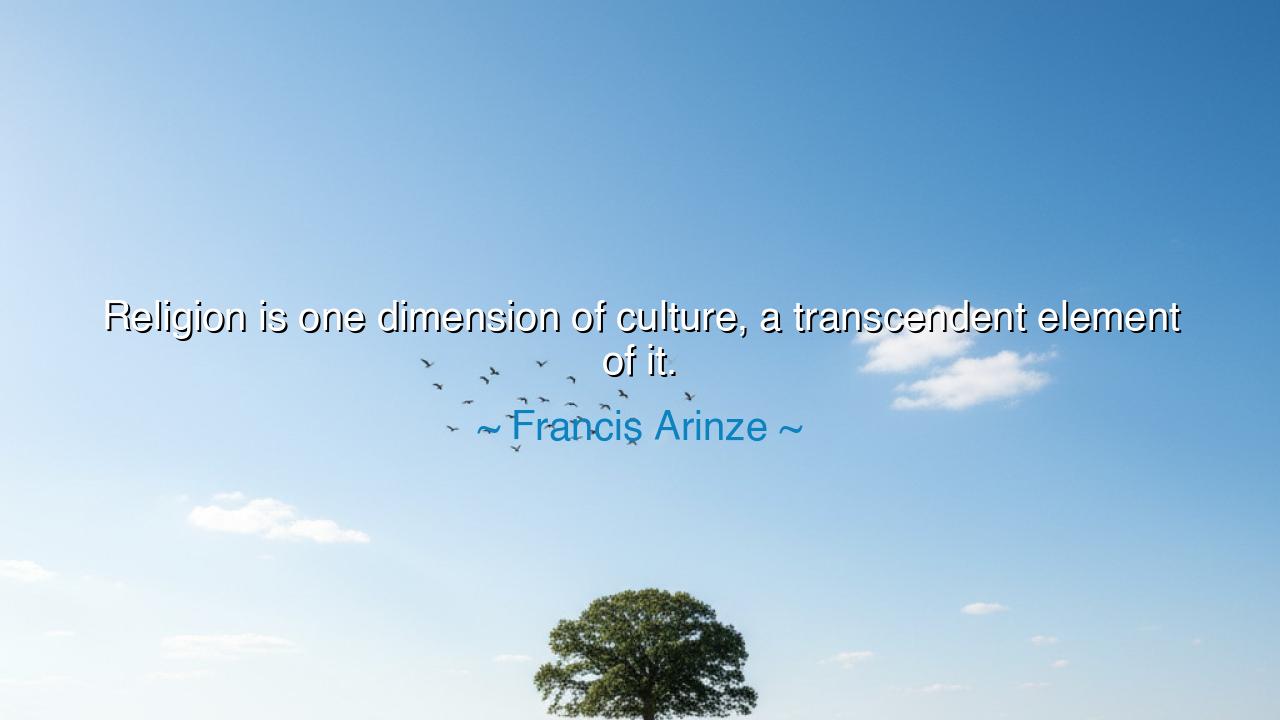
Religion is one dimension of culture, a transcendent element of






Francis Arinze, wise shepherd of souls, spoke with clarity when he declared: “Religion is one dimension of culture, a transcendent element of it.” In this statement he names the mysterious bond between the human and the divine, between the songs of the people and the voice of eternity. Culture expresses the heart of a community—its language, its art, its customs, its stories. But within culture, there is one strand that rises above the rest, reaching beyond the visible to the invisible: that strand is religion. It does not merely describe life; it seeks the meaning behind life. It does not only preserve tradition; it seeks the eternal.
The ancients understood this inseparable link. Among the Greeks, religion and culture were woven together: temples were not only sacred spaces but also the center of civic life, festivals were both religious and artistic, and even the great dramas of Aeschylus and Sophocles were offerings to Dionysus. To remove religion from their culture would have been to tear out its heart. Arinze’s words remind us that in every civilization, the transcendent has always been present—not as an ornament, but as the very breath that lifts culture beyond survival into meaning.
Consider the story of the medieval cathedrals of Europe. These soaring structures were more than places of worship; they were the gathering points of entire societies. Within them, art, music, learning, and architecture converged. The stained glass told stories, the chants lifted hearts, the carvings taught the illiterate the mysteries of faith. These cathedrals embodied Arinze’s truth: religion as a transcendent element of culture—lifting human craftsmanship into expressions of the divine. Without the religious vision that inspired them, they would have been mere stone. With it, they became eternal monuments.
The same can be seen in lands far beyond Europe. In India, the rhythms of dance, the poetry of the Vedas, the architecture of temples, and the music of devotion are inseparable from religion. In Egypt, the pyramids themselves, those colossal markers of civilization, were not merely tombs, but sacred symbols of eternity and cosmic order. Again and again, history testifies that when humans sought to build culture, they built it upon the foundation of the sacred.
Arinze also warns us, by implication, that to strip culture of religion is to rob it of transcendence. A society without its spiritual dimension may still have wealth, art, and entertainment, but it loses its upward gaze. It risks becoming flat, shallow, consumed with the temporary. True culture is not only about how we eat, dress, or entertain ourselves; it is about how we wrestle with the eternal questions: Why are we here? What is justice? What is love? What lies beyond death? These questions are answered not only by politics or economics, but by religion—the transcendent dimension that gives culture its highest dignity.
The lesson for us is clear: if we wish to preserve and enrich our culture, we must honor its spiritual dimension. A culture without religion becomes brittle, for it forgets its roots in mystery, reverence, and the search for truth. Whether you walk in the cathedrals of the West, the mosques of the East, or the sacred groves of Africa, remember that these places are not just cultural relics; they are the wells from which entire civilizations have drawn meaning.
Practical actions follow. Learn to see your own culture not only as custom, but as part of something transcendent. Study its spiritual roots, honor its sacred expressions, and allow them to shape how you live. If you create art, let it point beyond yourself; if you teach, let your lessons carry a sense of the eternal; if you serve, let your service be infused with reverence. In this way, you do not merely consume culture—you become a bearer of its transcendent element.
O seeker, carry Francis Arinze’s wisdom: religion is the transcendent dimension of culture. Without it, culture is flat; with it, culture touches the heavens. Therefore, honor the sacred within your heritage, cherish the spiritual in your daily life, and allow the transcendent to guide your steps. For culture is not only what we make—it is also how we reach for what lies beyond ourselves.






AAdministratorAdministrator
Welcome, honored guests. Please leave a comment, we will respond soon